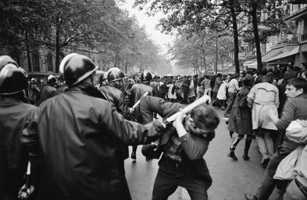
Paris Uprising: Students are injured by policemen on a Paris street during the violent riots of May 1968
(2 of 2)
What made the riots so contagious was the unstoppable spread of a new, global pop culture that was at once naively idealistic and astoundingly hedonistic. "Sexual intercourse began/ In nineteen sixty-three," wrote the British poet Philip Larkin. That was the year of the Beatles' first major hit single, "I Want to Hold Your Hand". London gained a reputation as a city of young swingers, symbolized by blond birds with long, lank hair, tripping down the streets of Chelsea in Mary Quant's pert minis. And it wasn't just London: soon nearly all Europe's youth pulsed to the driving rhythms of rock. Thanks to that problematic new medium, television, a trend in music, fashion, art or literature that began in one nation almost instantly became Europe's common denominator. The generation gap took on new meaning.
Eventually the students went back to class — or most of them did. The '70s, however, produced a far more ominous threat to law and order: terrorist gangs of both right and left, the hard core of the evanescent revolutionary moment. What made them so dangerous was not their numbers but their daring unpredictability. All Europe was shocked when the Red Brigades in 1978 kidnapped and murdered Italy's former Prime Minister Aldo Moro. West Germany's trial of the century involved Andreas Baader and Ulrike Meinhof, whose Red Army Faction had been responsible for a series of murders, bombings and bank robberies. Basque separatists and the I.R.A. carried out sporadic wars of attrition against their Spanish and British "oppressors." Palestinian extremists targeted Israelis and Americans as enemies — most spectacularly at the 1972 Olympic Games in Munich, where 11 Israeli athletes were held hostage and killed by Black September terrorists.
Conversely, the '60s and early '70s were years of uncommon prosperity for much of Western Europe. Inflation was moderate and unemployment low, except in Britain and Spain. Prosperity spawned a new demographic phenomenon: the so-called guest workers from poor countries like Turkey, Greece and Portugal, who migrated by the millions to France and both Germanys in quest of hard currency. A symbol of Europe's economic and technological assurance was the sleek, needle-nosed British-French supersonic Concorde, which made its first flight in 1976. The U.S. had nothing to match it, nor did the Soviet Union.
This golden age, as some have called it, came to a shuddering halt after the Middle East war of 1973. The Arab nations imposed an oil embargo on the U.S. and most of Western Europe that resulted in a fourfold increase in crude prices within a year. The cost of other raw materials also rose. Food prices soared, thanks to massive Soviet purchases of Western wheat and corn that pushed up the cost of feed grains. Even after the embargo ended, oil prices continued to rise as OPEC, the producers' cartel, displayed its newfound muscle. Recession and inflation spread worldwide.
The oil crises of the '70s revealed the fragility of Western Europe's economies and created new preoccupations with scarcity. But there were some salutary side effects. Energy conservation took hold, at least for a time, inspired in part by a new political force: the ecology-centered environmental movement known as the Greens.
Despite their fresh vision of old problems, the Greens did not set the agenda for Europe in the '80s. That role was played primarily by two remarkable — and remarkably disparate — leaders. A onetime actor and quarry laborer under the Nazis, Cracow's strong-willed Cardinal Karol Wojtyla was elected Pope John Paul II in October 1978. He was the first non-Italian Pontiff in 41 1/2 centuries. The following spring, an Oxford-educated shopkeeper's daughter, the equally strong-willed Margaret Thatcher, became Prime Minister of Britain. She was the first woman to hold that office. In their personalities and their messages, both leaders embodied steadfastness, discipline and an unwavering sense of purpose in redirecting the entities they served and governed. Their dynamic conservatism was oriented to the future, not the past.